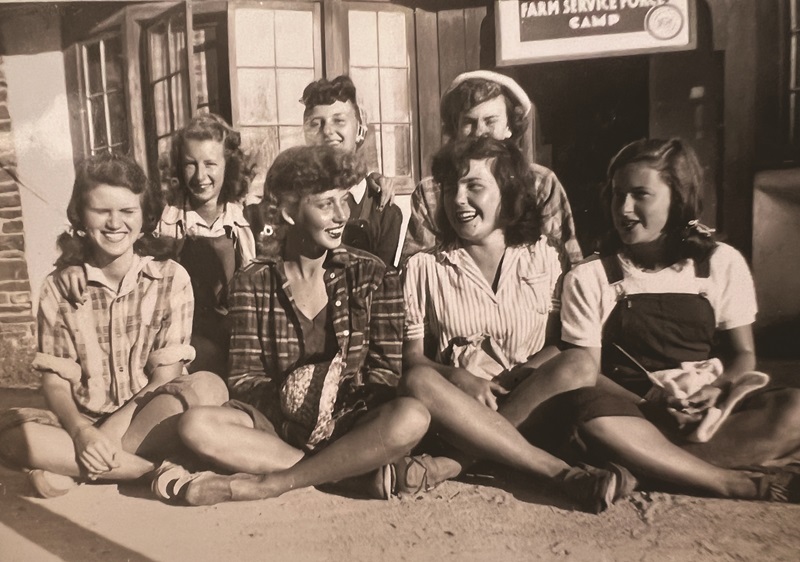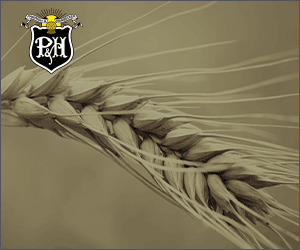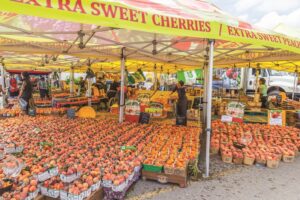Remembering the Farmerettes
SUPPORTING THE WAR EFFORT ON THE HOME FRONT

BASED WRITER, PHOTOGRAPHER, AND HISTORIAN, remembers when she first found a small black and white photo while sorting through some of her husband’s belongings after he passed away in 2016.
“I came to a tiny picture. It was just two inches by two and a half inches, so tiny compared to the four by sixes that we get in this day and age,” she says. “It had three girls dressed in farm-type clothes sitting on the running board of an old car. And I thought, oh, not his cousins. I wonder who these people are.” On the back of the photo was written ‘Farmerettes, around 1946’.
“I thought, who are the Farmerettes? Nobody taught me about them. And I was kind of indignant in my own mind, thinking, I kind of pride myself in knowing some Ontario history. And I thought I don’t know this story. I need to know this. And that moment, I decided I was going to start doing research, and I was going to figure it out.”
ADVENTURE CALLING
The Farmerettes, Sitter learned, were young women who filled the labour gap on Ontario farms during World War II, with so many young men off to war. Started in 1941, the program, run by the Canadian government, enlisted high school-aged women, mainly from urban or non-farming areas, to spend their summers working on farms. With the promise of a wage, high school credit (the women left before the end of the school year), and adventure, thousands of young women embarked on a summer-long work experience that saw them planting crops and tending livestock – jobs that had formerly been the primary domain of men.
“Girls from Northern Ontario made up a big portion of [the Farmerettes] because there were no jobs, no opportunities for them up there,” says Sitter. “The boys got work in the mills and the mines, but there was nothing for the girls.”
“A lot of them had never been more than seven miles from home.” Sitter continues. “So this was adventure calling.”
The women were paid 25 cents per hour, the going rate for farm work for men at the time, though they paid for their room and board from their earnings. It was hard work with a steep learning curve, especially for those who had no farm experience. “Within weeks, the girls were showing that they could do the work. I mean, the first two weeks were probably pretty brutal,” says Sitter. “They worked hard all day in the hot sun, and it was dirty. But by the end of the summer, the girls were in tears, not wanting to say goodbye to the new friends, and the farmer was saying, ‘I couldn’t have done it without you. I hope you’ll come again next year.’”
Many of the women did just that, spending multiple summers in the program, which lasted until 1951.
ONION SKINS AND PEACH FUZZ
Shirleyan English was one of those Farmerettes; she had come from North Bay at age 16 to work on the Sitter farm near Thedford, Ontario. Sitter and English connected after Sitter wrote a piece for the Rural Voice about the Farmerettes, and together, they worked to bring the stories of more than 300 women to life in a book called Onion Skins and Peach Fuzz: Memories of Ontario Farmerettes.
“I thought from the beginning that it was more than a book,” says Sitter, who witnessed the story of the Farmerettes come to life as a play debuted at the Blyth Festival and the Fourth Line Theatre in 2024. Written by Canadian playwright Alison Lawerence, the play presents a fictionalized retelling of the experiences of the Farmerettes.
Next up for Sitter is working with a local documentarian, Colin Field, to produce a documentary about the Farmerettes.
“Their voices and memories needed to be recorded,” says Sitter. “You see lots of senior men having their stories being made into documentaries, but you rarely see senior women being interviewed and recalling their lives.”
Sitter and Field are currently raising funds to produce the documentary, which she hopes to release later this year, and they will enter it into film and documentary festivals. Grain Farmers of Ontario is supporting the documentary.
GOOD IN EVERY CLASSROOM
Grain Farmers of Ontario’s Good in Every Classroom program helps make curriculum-linked resources about food and farming available to Ontario students and teachers. Since 2021, Good in Every Classroom has partnered with Sitter to help students commemorate Remembrance Day and learn about World War II history by telling the story of the Farmerettes. Resources include a video, discussion guide, literacy activity packs, art projects, and cursive writing examples using actual letters from Farmerettes written during their time working on farms.
Like Sitter, Ontario students using the Farmerette resources have been astonished that this piece of Ontario history was almost lost.
“The students in my class really appreciated [learning about the Farmerettes],” says Anne Gagnier, an Ottawa Carleton District School Board teacher. “They had a lot of comments like “How come I didn’t know about them? What they did was really important.”
GET IN TOUCH
Sitter is eager to connect with people who have experience working as Farmerettes or want to learn more about how to help bring history to life. They can contact her at bonnie.sitter@gmail.com or 519-235-1909. •


























